

Prepositions of time. The definite article. We use the, the definite article, before a singular or plural noun.
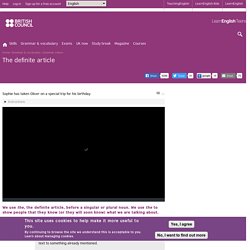
We use the to show people that they know (or they will soon know) what we are talking about. Can you explain with examples? Of course. The definite article, the, can refer backwards in a conversation or text to something already mentioned. … my sister there hid a little parcel in my suitcase, so when I was unpacking the case I had a really cool surprise ... It can also refer forwards to something which is going to be mentioned or explained. Could you bring me the knife which you gave me? Does the always refer backwards or forwards? No, it can also refer to shared knowledge or general knowledge. But I'll try to connect from the hotel every evening. OK, I understand those rules, but I’ve seen lists of different uses of the. All right, I can give more specific examples, but they fit into the three areas I’ve given you.
And is the internet connection good? Personal pronouns and possessives. Question words. We use the question words who (for people), what/which (for things), when (for time), where (for places), why (for reasons) and how (for more details).
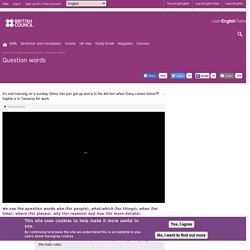
What do I need to know about question words? I know you know the basics, but questions are quite tricky. Let’s just go over the main rules. We usually form questions by putting an auxiliary verb, or a modal verb, before the subject. Does it suit me? Adverbs of frequency. Oliver: No, no!
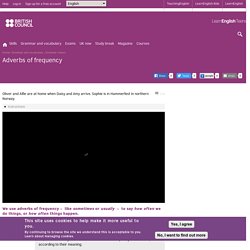
I can never answer the yellow questions – they're about history or politics or something, I think. I'll have an orange question, please, Mr Anderson! They're about sports, right? Alfie: They're not always about sports – they're sometimes about food and drink.Oliver: Not a problem, Mr Anderson. The present continuous. We use the present continuous (am/is/are + -ing) to talk about temporary things which have begun but haven't finished.
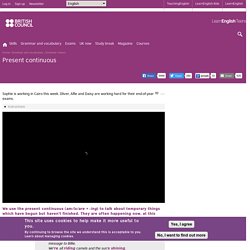
They are often happening now, at this moment. Here are some examples of things happening now. I'm just uploading some photos to Facebook and I'm sending a message to Billie. We're all riding camels and the sun's shining. They're waiting for me to get off the phone! The past simple – irregular verbs. This, that, these, those. Sophie: Darling, hi, it’s me.
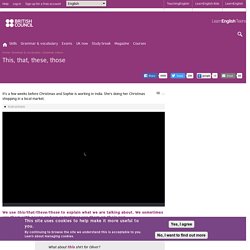
Daisy: Hi, Mum. The past simple – regular verbs. The past simple is the most common way of talking about past events or states which have finished.
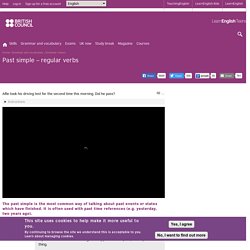
It is often used with past time references (e.g. yesterday, two years ago). Please explain past events or states! A past event could be one thing that happened in the past, or a repeated thing. I stopped at a zebra crossing. We carried on with the test. A state is a situation without an action happening. We stayed at my grandparents' house last summer. How do you form the past simple? Regular past simple forms are formed by adding -ed to the infinitive of the verb. start → startedkill → killedjump → jumped. To be – present and past. The form of the verb to be is am (contracted to 'm), is ('s) and are ('re) in the present tense and was/were in the past.
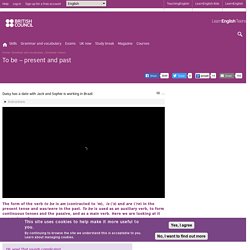
To be is used as an auxiliary verb, to form continuous tenses and the passive, and as a main verb. Here we are looking at it as a main verb. After the verb to be we use an adjective phrase, a noun phrase, a preposition phrase or an adverb phrase. Countable and uncountable nouns. Some nouns in English are countable - we can use them in singular and plural forms.
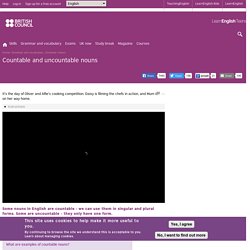
Some are uncountable - they only have one form. We often use a/an with singular countable nouns and some with plurals. Have got. Daisy: I can’t wait to taste your Master Chef dishes!
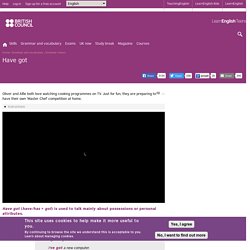
What a crazy idea, though, for you two to have a cooking competition! Oliver: Well, it’s time to find out who really is the best chef! Alfie: There can only be one Master Chef.Oliver and Alfie: And this year’s Master Chef champion is...Daisy: You two are crazy! Come on, I can’t stay long. I’ve got swimming practice at 7.Oliver: OK, have you got the shopping list? Daisy: Hi, Mum! Alfie: Have you got everything you need? The present simple. We use the present simple to talk about repeated actions or events, permanent states or things which are always true.
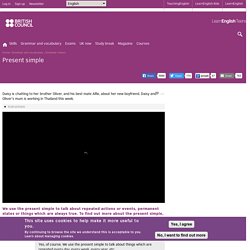
To find out more about the present simple, read and listen to the conversation below. Can you give me some examples? IRREGULAR VERBS TO LEARN IN 5E LEVEL.